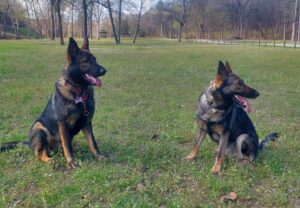Table of Contents
Introduction

Choosing a puppy requires careful consideration to ensure a healthy and suitable companion. All the more so when you are choosing a German Shepherd puppy. Understanding how to choose a puppy can save heartache down the road. Look for a pup that is active, playful, and friendly, with bright eyes and a healthy coat. Additionally, observe the pup’s interaction with its littermates and humans to gauge its temperament. It’s also important to verify the breeder’s reputation and the puppy’s lineage to check for potential genetic disorders common in German Shepherds. Remember, bringing a puppy home is a long-term commitment and should not be taken lightly.
Consider a Test Drive Visit

A test drive is a great way to get an idea of the pup’s temperament before you make a purchase. Ask the breeder if you can take the puppy out for a walk or playtime in a safe environment, such as their own backyard. During this time, observe how confident and well-behaved your potential pup is when interacting with other animals or people.
I drove 7 hours to my breeder’s home to pick Jasper from among the three puppies that were the color and sex I preferred. Puppy assessment tests are by no means necessarily accurate predictions of what your adult dog’s character will be but if you have an idea of what you are looking for they can give you some information. The older the puppy the more accurate the results.
Test for Temperament
The test includes holding a puppy cradled in your arms on his back with your hand resting on his chest. If the puppy tolerates this position and relaxes with a calm breathing pattern, it might indicate that the pup is calm and won’t be easily intimidated. Similarly, if the puppy squirms or tries to avoid interaction with you, this may suggest a more willful temperament. Another test to try is holding the puppy gently under his armpits with his legs dangling while looking into his eyes. If he tolerates this position and responds to you with eye contact, this is a good indication that the pup can handle being restrained and may be less willful.
The thing to keep in mind with these tests is, if the puppy is less than 7 weeks old it may not be as accurate a prediction of his ultimate adult character.
Other Things to Consider
Does the puppy run to investigate you when you come in the room? Does he seem to enjoy being touched and held? If you make a loud noise such as clapping your hands does he cower, hide, or look curious?
The other guide is your breeder. Puppies develop a hierarchy with their littermates. If you are looking for a high-drive dog look in the working lines and look for the puppy who exhibits drive around feeding and play with his litter mates.
Jasper loved being cuddled. His two brothers did not tolerate that as well. He stood his own with his siblings but did not feel the need to dominate them which his breeder indicated the other two brothers were doing with their siblings. She felt Jasper was a middle-of-the-road puppy regarding drive. Had I been looking for a dog to do bite sports that might not have been what I wanted. Since I wanted a dog to do less prey-driven sports like tracking, dock diving and rally, Jasper seemed a good fit.
It’s also important to ask questions about the pup’s parents. Ask your breeder for detailed information on the pup’s parents’ temperament.

I met Jasper’s mother and father. Mia having just had puppies, was a little less than pleased to see a stranger. In this visit above her true sweet nature was obvious.
What are you Wanting the Dog For?
What are you wanting the dog for? Do you need a guard dog that will take on that role in your home, or do you want a loyal companion who will make a great family pet? German Shepherds have varied personalities and can fulfill either of these roles depending on how they are trained but they are not a dog breed that will be content without a job of some kind. Consider the pup’s energy level as well; some may be more suited for active owners than others.
Do you have young children? If you are looking for a calm family pet, a working-line German Shepherd puppy might not be the right choice. Jasper’ genetics are from mostly working lines, but his breeder breeds for pet-quality dogs. Her breeding pair are calm and friendly by nature, as German shepherds go. Even a clam German Shepherd could easily knock a small child down though, with nothing but his tail!
If Problems Occur
I researched as much as I could, spent good deal of time building foundational bonding and put Jasper in training classes early. Even so, through a variety of, what I can see now were, missteps, none of which I could have foreseen because you don’t know what you don’t know, Jasper developed leash reactivity as he approached adulthood and I had to get expert help to resolve the issue.
Consider seriously if you are ready to stick by your dog if he develops such issues Do you have the resources to pay for a special trainer? Will the dog just end up on a chain in your yard or surrendered as many German Shepherds are to rescues? If you get in over your head will the breeder take the puppy back? If not, pick another breeder. There are resources out there but they are not inexpensive, not always easy to find and you can easily end up in a place that makes the problem worse! All trainers are not equal.

For all that, I have no regrets. Jasper is a great dog who seems to love all “people” he meets and I consider this a bump in the road. Ok, maybe a big bump, but still a bump.
For a deeper dive on German Shepherd Training check out my article.
If you’d like to hear what Jasper thinks about the Pros and Cons of German Shepherds go check out his article!
Rescues as a Source
Consider getting your pup from a rescue center or animal shelter. These pups are already more mature and have likely been tested by the rescue for temperament. They will also come with a full medical history, so you can be sure of their health before bringing them home. Be careful though as these dogs may also come with issues that require more patience and extra help.
Rescues don’t always know the history of the dog they receive. Abused dogs can have reactions to various things that might not make them appropriate for certain homes. Though it’s no fault of the dog once again, don’t get in over your head. You won’t be doing the dog any favors.
Still, there are thousands of dogs in rescues needing homes. Many of them are full-blooded German Shepherds. Sometimes the only issue is the owner died or became too disabled to care for the dog. These dogs could make wonderful family pets for the right home.
Health
Finally, make sure to ask the breeder plenty of questions about the puppy’s health and history before you take it home. This includes asking for veterinary records, an overview of their breeding program, and any information they can offer on potential genetic issues or diseases that may affect the pup’s health. In particular German Shepherds need to be cleared for genetic issues such as hip dysplasia and elbow dysplasia. By doing your due diligence, you can guarantee a healthy and happy German Shepherd puppy in your home for years to come.
Socialize Carefully
No matter where you get your puppy, socialization is essential from an early age. Puppies learn behaviors best in the first few months of life, so it’s important to start training as soon as possible. Good socialization includes introducing them to different people, places, and situations that they can handle emotionally. This will help them develop the confidence and social skills they need to be a happy, well-adjusted dog. With proper training and socialization, you can have a loyal life companion. However, don’t take your puppy to places other dogs will be until he is fully vaccinated.
If you have children, they will no doubt be excited. Monitor the interaction carefully and be sure the children are taught how to interact calmly with the dog and distract those needle sharp puppy teeth with a toy.
For more on socializing your German Shepherd Puppy check out my article
Getting to Know Baby
The first month with your new puppy should be spent building your bond through play, establishing rules and bonding activities like grooming, walks, feeding, sleeping and so forth. You want to make sure that your puppy is healthy and ready for the big world, which means getting him regularly checked up at the vet. It’s also important to provide mental stimulation with activities like teaching basic commands through luring or playing games such as hide and seek. Finally, remember to give your pup plenty of love, attention, and positive reinforcement so he knows you are there for him and that you love him. With the right care, German Shepherds can be a great addition to any family.
Conclusion
Choosing a puppy is an important decision. German Shepherds live 12-14 years in some cases and grow to be large powerful dogs. It’s important to consider your lifestyle and the needs of the breed when making a decision. Make sure you are prepared for your new pup with supplies, training, proper health care, and plenty of love. With the right care and attention, you can have a loyal four-legged companion for life!
Resources:
McCann Dog Has a great series on youtube on puppy care. I’m not affiliated with them though I may check into that! I just like the way they approach dog training and this puppy series is a good place to start. So many problems can be avoided with a little preperation.
Another site I like is Leerburg. No affiliation with them but if they have one I may consider it! But I have taken several of their online courses and found them worth the money.
